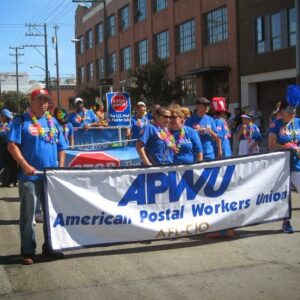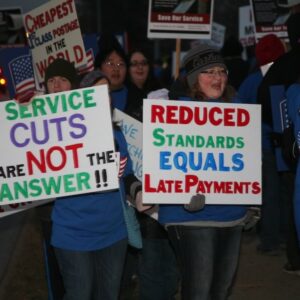May 1, 2016
National Negotiations, Grievance Settlements
(This article first appeared in the May-June 2016 issue of The American Postal Worker magazine.)
At the interest arbitration hearing for a new contract in february, the Clerk Craft presented two panels of workers who explained their job responsibilities to the panel of arbitrators.
The workers’ testimony demonstrated that their work is much more complex than you might expect from reading the standard position descriptions.
They explained that they usually perform their duties with little or no supervision and described how their extensive experience on the job greatly enhanced their ability to provide good service to their communities.
In addition, two multi-craft panels of Postal Support Employees (PSEs) gave passionate, articulate, and disturbing testimony regarding their treatment at the Postal Service.
The PSEs explained that they felt like a lower class of people because a U.S. government agency – the Postal Service – pays them low, unequal wages for the same work, requires them to work long hours with hardly a day off, and is creating a culture of disrespect toward new employees.
PSEs explained that USPS wages for PSEs are so low that some qualify for government assistance.
National Grievance Settlements
The Clerk Craft, with Assistant Craft Director Lamont Brooks serving as the lead officer, recently settled four disputes with the Postal Service as part of a pre-arbitration review process agreed upon by APWU President Mark Dimondstein and management. The settlements are as follows:
Mail Processing Clerks, Day to Day Seniority, and Light/Limited Duty Employees: “In Mail Processing, when management determines the need to assign employees outside of their primary assignment area, such assignment will be based on operational needs and the employee’s qualification, in accordance with the May 9, 2002, MOU [Memorandum of Understanding] Re: Mail Processing Clerk Position. Day-to-day seniority will be applied as follows:
“1. When management determines the need to assign an employee, or a number of employees outside of their primary assignment area, the employees are moved by juniority (except when a junior employee with a scheme assignment has not reached the current minimum 30-hour sortation during the accounting period). (See Article 37.3.F.10 and the 2012 JCIM, Article 37, page 8- Q&As 33 & 34)
“2. Any employee not holding a bid duty assignment, within the principal assignment area, will be moved prior to moving any mail processing employee who holds a bid duty assignment.
“Accordingly, the parties agree that any case held pending this national dispute will be resolved in accordance with this agreement and local fact circumstances.”
Lead Clerk and Time and Attendance Collection System (TACS) Training and Duties: “The interpretive issue in this dispute is whether the MOU Re: Clerk Craft Jobs, Section 2, and the subsequent Lead Clerk Questions and Answers (Q&As) dated May 4, 2012, require that all employees occupying Lead Clerk duty assignments must be given access to the Lead Clerk Role in TACS, receive the required TACS training, and be assigned TACS duties.
“1. All Clerk Craft employees occupying Lead Clerk duty assignments will be provided the required training for the Lead Clerk Clock Office role in TACS.
“2. Access to the Lead Clerk role in TACS and assignment of TACS duties is based on local operational circumstances. Example: Where there is more than 1 Lead Clerk duty assignment within the facility, not all Lead Clerks must be assigned TACS duties. However, a minimum of one will be assigned the Lead Clerk Clock Office role in TACS to perform these duties.
“3. The parties agree that the provisions above are only applicable in facilities that meet the criteria for Lead Clerk duty assignments in accordance with the MOU Re: Clerk Craft Jobs and the MOU Re: POStPlan: Staffing of Offices, Filling of Assignments, PSE Usage and Conversions.
“4. In facilities that are authorized Lead Clerks and in POStPlan offices that are authorized Lead Clerks in the APO installation, TACS duties will be assigned to the Lead Clerk in accordance with the TACS Lead Clerk Clock Office role.”
Custodial Duties Performed by the Clerk Craft – Questions and Answers:
“When the two hours or less of custodial work cannot be combined with other maintenance duties to create a duty assignment: CLERK CRAFT
“1. How will the time be recorded when performing the custodial duties? It will be recorded under maintenance LDC 38 and the applicable operation number (747 or 748), and the custodial duties will be in addition to the clerk craft duties that are part of the bid duty assignment.
“2. How much additional time will be allowed? The time allowed for custodial duties will be based on Line H of the MS-47.
“3. Can a Part-Time Flexible (PTF) or Postal Support Employee (PSE) assigned to the facility perform the custodial cleaning duties? Yes, when the custodial duties can’t be added to an existing duty assignment.
“4. Will the employee performing custodial duties receive required OSHA training? They will receive required OSHA training based on the duties expected to be performed.
“5. Will clerks be required to perform custodial duties between waiting on customers? No. (See MOU on page 427 of the CBA)”
204-B Details beyond 90 days: “The interpretive issue in this dispute, is whether the MOU Re: Clerk Craft Jobs, Section 2.D requires that if the 204-B detail assignment exceeds the 90 day limit, the supervisory work performed by the 204-B, on the 91st day and beyond, must be considered bargaining unit work.
“The parties agree that there is no interpretive issue regarding the 90 day limitation pursuant to Section 2.D of the MOU and the Oct. 20, 2011, Q&As. Alleged violations should be investigated based on local fact circumstances, and the Union may file grievances in accordance with Article 15.”
Sonia Canchola Appointed Clerk NBA
Sonia Canchola was appointed to fill the vacant San Francisco Region Clerk Craft National Business Agent position, filling the vacancy that was created by the death of Gilbert Ybarra.
Canchola served as president of the California Area Local from May 19, 2014, through March 19, 2016.
She was recommended for the position by Clerk Craft Director Clint Burelson, and, in accordance with the APWU Constitution, the recommendation was approved by the Clerk Craft Council.



